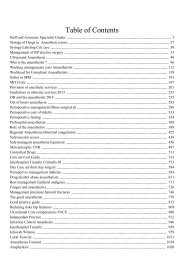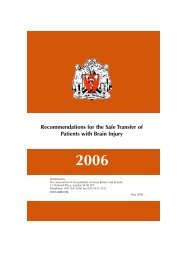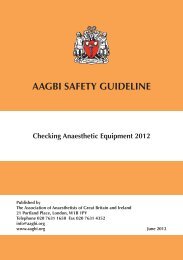TheatrePracticeStandardsGeneric1
You also want an ePaper? Increase the reach of your titles
YUMPU automatically turns print PDFs into web optimized ePapers that Google loves.
Generic Theatre Standard No 06F - Management of Patients with<br />
suspected/confirmed Norovirus in the Operating Theatre Department<br />
Standard Statement: All Theatre staff will have knowledge of the requirements for caring for<br />
patients with Norovirus in the operating department to protect self, colleagues and patients from<br />
the risk of health care acquired infection.<br />
Norovirus is a major cause of acute gastroenteritis and diarrhoea in children and adults. The cause<br />
of illness, Norovirus (previously known as Norwalk-like or Small Round Structured Virus) was<br />
described in 1968 in samples from an elementary school in Norwalk, Ohio. The disease is often<br />
termed Winter Vomiting Disease because of the increased prevalence in the winter months;<br />
however it can be detected throughout the year.<br />
Norovirus is the most common cause of outbreaks of gastro-enteritis in hospitals and can also<br />
cause outbreaks in other settings such as schools, nursing homes and cruise ships. Hospital<br />
outbreaks often cause major disruption in hospital activity resulting ward closures, cancelled<br />
admissions and delayed discharges which can significantly reduce clinical activity for the duration<br />
of the outbreak. Failure to observe and comply with Infection Control guidelines/policy can lead to<br />
further spread of infection and a delay in the hospital returning to normal activity. Outbreaks can<br />
affect both patients and staff, sometimes with attack rates in excess of 50%. For this reason, staff<br />
shortages can be severe, particularly if several wards are involved at the same time. It is therefore<br />
essential that cases are detected early and isolated appropriately to prevent spread and major<br />
outbreaks.<br />
General Considerations<br />
Please see Policy for the Management of outbreaks of suspected / confirmed Norovirus<br />
Generic Theatre Standard 04 - Infection control in the Operating Department<br />
• Staff risk Noroviruses are highly contagious. Noroviruses are transmitted primarily<br />
through the faecal – oral route either by person to person spread or via contaminated<br />
food or water. In addition Noroviruses can be spread via aerosol dissemination of<br />
infected particles following vomiting. Transmission can also occur through hand<br />
transfer of the virus to the oral mucosa following contact with environmental surfaces,<br />
fomites and equipment which have been contaminated with either faeces or vomit.<br />
Norovirus can survive for up to 12 days on some surfaces.<br />
• Patient position on list schedule Preferably at the end of the list<br />
• Hand Hygiene the hands of healthcare staff can provide the vehicle for the<br />
transmission of norovirus. It is essential that all staff wash their hands when required<br />
using the correct washing technique to help reduce the risk of transmission. Alcohol gel<br />
IS NOT effective against these viruses and therefore hands must be washed with soap<br />
and water before and after every patient contact and contact with potentially infectious<br />
equipment, furnishings or other fomites. Gloves do not obviate the need to wash<br />
hands.<br />
• Personal Protective Equipment (PPE) aprons and gloves must be used appropriately<br />
(single use items) and for each episode of care/treatment/examination on all patients<br />
by all staff. These must be changed for each episode of care. There is currently no<br />
evidence to support the wearing of face masks for either patients or staff.<br />
• Environment/equipment cleaning All equipment that the patient has come in contact<br />
with must be cleaned with a chlorine based disinfectant e.g. Actichlor plus, after the<br />
patient has left the theatre.<br />
• Recovery PACU instructions These patients SHOULD BE recovered in theatre.<br />
38





